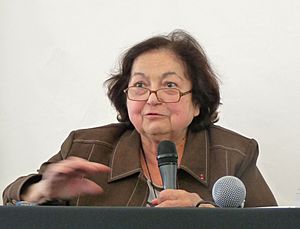Françoise Héritier facts for kids
Quick facts for kids
Françoise Héritier
|
|
|---|---|
 |
|
| Born | 15 November 1933 Veauche, Loire, France
|
| Died | 15 November 2017 (aged 84) Paris, France
|
| Region | Anthropology, ethnology |
|
Notable ideas
|
The differential valence of the sexes |
|
Influences
|
|
Françoise Héritier (born November 15, 1933 – died November 15, 2017) was a famous French anthropologist and ethnologist. She was also a strong supporter of women's rights. She took over the important position of Claude Lévi-Strauss at the Collège de France. Her main work focused on how societies are organized. This included ideas about how people form alliances and rules about who can marry whom. She was influenced by Lévi-Strauss and Alfred Radcliffe-Brown.
Contents
Her Life and Studies
Françoise Héritier grew up in a small, modest family in Loire, France. She described her family as "small and reasonable middle-class people who came from farming." She went to school in Paris.
One day, she attended a special talk by Claude Lévi-Strauss at the Sorbonne University. He was talking about "joking relationships" in Fiji. This talk was a big moment for her. She felt a "revelation" and decided to study ethnology. In 1957, she traveled to Burkina Faso (which was then called French Upper Volta). She went there for a research trip with anthropologist Michel Izard, whom she later married.
Françoise Héritier was part of a way of thinking called structuralism. This approach looks at the hidden rules and structures that shape human culture and society. She explored ideas about what is "identical" and what causes "repulsive frustration" in societies. Her ideas built upon the work of Claude Lévi-Strauss and Alfred Radcliffe-Brown. She especially focused on the ideas of "nature" and "environment" in how societies are built.
Like Claude Lévi-Strauss, Françoise Héritier first worked at the EHESS. In 1982, she was chosen to join the Collège de France. She took over the Chair of Anthropology from Claude Lévi-Strauss. From 1998 to 2001, she was also a member of the ethics committee for the CNRS. This committee helps make sure research is done in a fair and right way.
Her Main Ideas
In her book Masculin/Féminin, Françoise Héritier pointed out something important. She noted that the difference between male and female is found everywhere in the world. She also observed that men are almost always seen as superior to women.
However, in her books Masculin/Féminin I and II, De la Violence, she showed something else. She used many examples to prove that the idea of men being higher than women is not natural. Instead, it is something that societies have created over time. This means it can be changed. She called this idea "the differential valence of the sexes." This phrase means that different values are placed on males and females. She preferred this term over "masculine domination," which was used by other thinkers like Pierre Bourdieu.
Françoise Héritier passed away on her birthday, November 15, 2017. She was 84 years old and died in Paris.
Works
- Françoise Héritier, Masculin/Féminin: La pensée de la différence, Odile Jacob, 1996.
- Françoise Héritier, Masculin Féminin II: Dissoudre la hiérarchie, Odile Jacob, 2002.
- Françoise Héritier, The Sweetness of Life, Penguin, 2014.
See also
 In Spanish: Françoise Héritier para niños
In Spanish: Françoise Héritier para niños
 | Bayard Rustin |
 | Jeannette Carter |
 | Jeremiah A. Brown |

